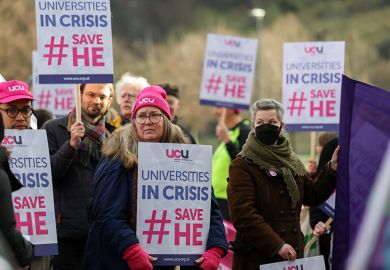I am unemployed for the first time in 52 years. My working-class relations, who could never see why I was wasting my time at school after I’d hit the legal leaving age of 15, would no doubt remind me that I had never had a “real job” in my life, so can’t be more unemployed than usual. Mining coal, driving lorries or sorting mail on the night train from Euston to Glasgow were real jobs. Being paid for reading books and talking to students was just a very long paid holiday. We go on about passing on the glories of Western civilisation to future generations – which I am all in favour of. But, I wonder how many of my generation have felt the need to demonstrate to sceptical aunts and uncles that we were doing something serious; it’s a powerful moral incentive when faced with piles of papers to grade and lectures to write. A generation that never paid tuition fees, and got a small but adequate grant to live on, was more susceptible than anyone today would be to the thought that we ought to justify our existence to the people with “real jobs” whose taxes paid for us.
It’s very easy to misremember, and to mistake a vivid false memory for the real thing, so comparing the academic world of 1963 and 2015 is a dangerous business. Some contrasts speak for themselves. When I hit Keele University in October 1963, as an assistant lecturer on £1,000 a year, the Robbins report had just been published. It proposed an enormous expansion in student numbers – to 197,000 by 1967-68 and 217,000 by 1973-74. In 2013-14, there were 194,245 persons listed as academic staff at UK higher education providers, and about 2,300,000 students of whom 1,533,855 were doing first degrees. But in 1958, the year after I sat A levels, only 3 per cent of 17-year-olds got three A-level passes, a figure that had risen to about 30 per cent in 2005.
The argument in the 1950s and 1960s prefigured the annual rows about declining standards of the past 20 years. “More means worse” said everyone opposed to expansion, to be met with the unanswerable objection that even on the most conservative estimate there must be a vast pool of untapped ability in the 97 per cent who didn’t go on to university, especially among women, who in 1960 got only a third as many first degrees as men – 5,575 to 16,851 – and less than one-tenth as many higher degrees – 279 to 2,994. That’s a ratio that has changed; the numbers in 2011 were a shade under 200,000 women getting first degrees to a little over 150,000 men; and even at postgraduate level the balance had shifted, with women getting 98,000 higher degrees and men 96,000.
Did more mean worse? Hasit been a huge success? Have we finally tapped all the untapped talent we can? The answer to the last question is obviously not, or the UK would be much more prosperous, happier, with more people doing the jobs for which their talents are suited and fewer being frustrated by finding their skills unused and unappreciated. The answer to the second question is less obvious; given the absurd hopes that my generation placed on what the expansion of higher education might mean, it’s been a terrible failure. The more rational view is that even without a miraculous transformation of industry, transportation, urban planning, the diffusion of culture, and the creation of a society in which healthy and well-educated citizens enjoy the benefits of vastly expanded leisure, it is still a very good thing to add to the number of people who have the time, energy, ambition and education to make the most of themselves. On those terms, it has been a huge success.
The unappeased will go on about more means worse regardless. It’s boringly obvious that more has meant different; changes in funding, where Britain has had its own version of the aversion to paying for students that has undermined public higher education in the US, are among the most obvious differences between then and now. Turning the polytechnics into universities in 1992 was another huge change. The old “binary” system that left polys in the hands of local authorities, and their academic staff treated more like secondary school teachers than university faculty, was unsustainable. Had the change been managed intelligently, we’d have had a genuinely binary system with a vocationally oriented sector providing the high-grade technical education that every observer has bemoaned the lack of since 1903, and providing ample applied research to serve the needs of industry. The knack of combining differentiation of function with equality of status continues to elude us.
The transformation of the polytechnics into (underfunded) universities was a symptom of the shift to a much more instrumental vision of higher education, not a cause. The real shift happened in the 1970s. The 1960s were better times for universities than the decades before or after. Older colleagues remembered having been assistant lecturers for three or four three-year stints, at the mercy of professors who might or might not like to encourage the young. We looked forward to tenure after a couple of years as expansion opened up possibilities and gave junior faculty unheard-of bargaining power. By the mid 1970s, it was all over: salaries were undermined by inflation, students were more anxious than we had ever been about the prospects of employment, and a much more utilitarian age had dawned. Still, as the survivors of 1789 and 1848 always said, having been young with a sense of the possibilities of limitless change was something to remember with pleasure.
Alan Ryan is emeritus professor of political theory at the University of Oxford. He was visiting professor of philosophy at Stanford University until the end of August.
POSTSCRIPT:
Print headline: Hindsight is a wonderful thing
Register to continue
Why register?
- Registration is free and only takes a moment
- Once registered, you can read 3 articles a month
- Sign up for our newsletter
Subscribe
Or subscribe for unlimited access to:
- Unlimited access to news, views, insights & reviews
- Digital editions
- Digital access to THE’s university and college rankings analysis
Already registered or a current subscriber? Login




